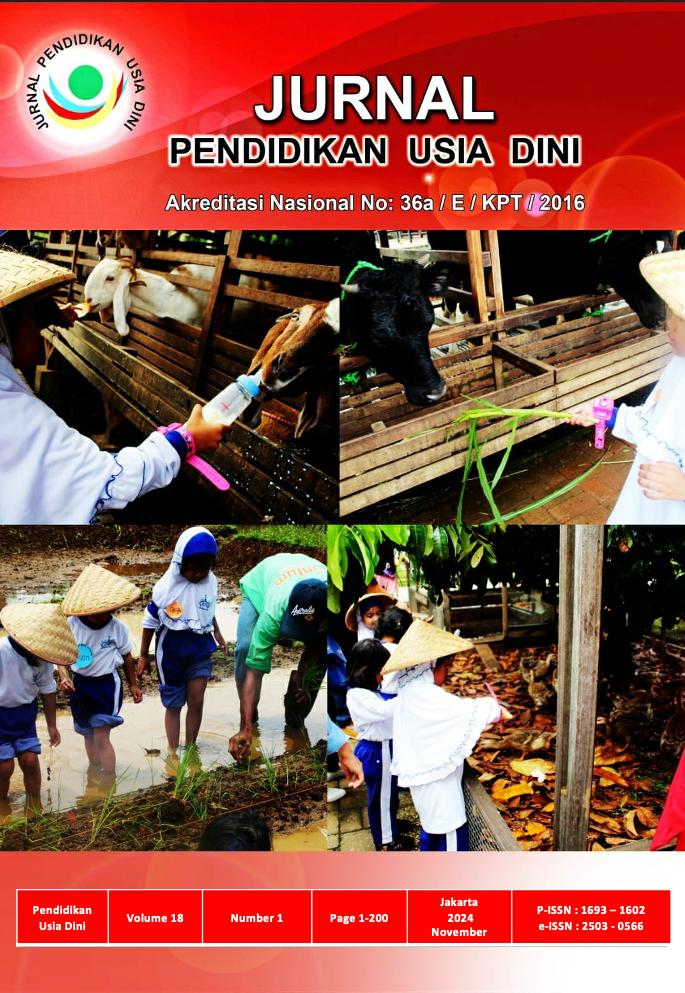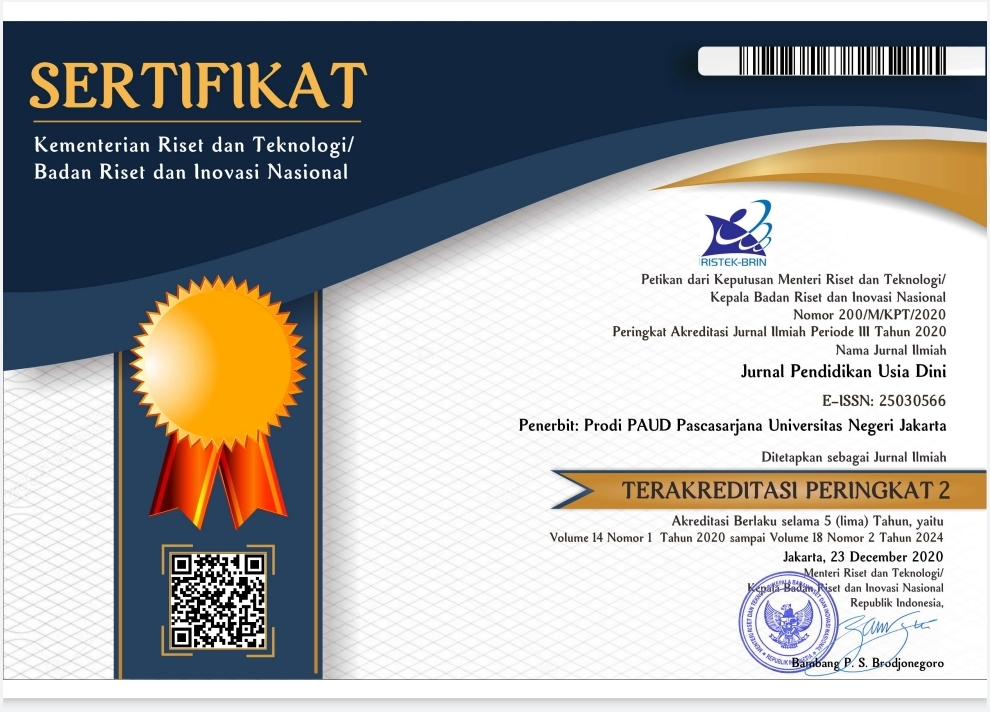Exploring the Labyrinth Of Thought: Teachers' Perceptions of the Importance of Science Learning in Early Childhood Education
DOI:
https://doi.org/10.21009/jpud.v18i2.48882Keywords:
Exploring, Teachers' Perceptions, Science Learning, Early Childhood EducationAbstract
This research aims to explore the understanding, planning, implementation, and evaluation of science learning carried out by early childhood education teachers, as well as identify the challenges faced and the solutions implemented. Using a qualitative approach, data was obtained through in-depth interviews with six teachers from various early childhood education institutions. Data analysis was carried out thematically by linking the research results to pedagogic theory and empirical context. The results of the study show that teachers have a diverse understanding of the concept of science, which is generally seen as a science to foster curiosity and critical thinking skills in children. In lesson planning, teachers use themes relevant to children's lives and develop exploration-based activities using simple tools and materials. The implementation of learning is carried out through hands-on experiments, demonstrations, and exploration-based projects designed to make science learning fun and meaningful. Evaluation of learning success focuses on children's enthusiasm, active participation, and understanding of science concepts. However, teachers face a variety of challenges, including limited tools and materials, limited learning time, and a variety of children's abilities. Creative solutions such as the use of local resources and additional motivation to children are often applied to overcome these obstacles. This research emphasizes the importance of science learning in early childhood education in supporting children's cognitive, social, and emotional development, as well as the need for institutional support in the form of training and the provision of resources to improve teaching effectiveness.
References
Abanoz, T., & Yabaş, D. (2023). My world of machines: an integrated STEM education curriculum for early childhood teachers. … Early Childhood Education Research Journal. https://doi.org/10.1080/1350293X.2022.2127822
Budiyono, A., Antika, L. T., Wildani, A., & Hadi, S. (2019). TRAINING IN MAKING SCIENCE-BASED EDUCATIONAL GAME TOOLS FOR EARLY CHILDHOOD TEACHERS. Journal of Community Service and Mathematics and Natural Sciences Education. https://doi.org/10.21831/jpmmp.v3i1.21237
Bui, T. L., Nguyen, T. H., Nguyen, M. T., Tran, T. T., & ... (1970). Research on STEM in Early Childhood Education from 1992 to 2022: A Bibliometric Analysis from the Web of Science Database. In European Journal of …. eu-jer.com. https://eu-jer.com/research-on-stem-in-early-childhood-education-from-1992-to-2022-a-bibliometric-analysis-from-the-web-of-science-database
Eliza, D., Mulyeni, T., Budayawan, K., Hartati, S., Khairiah, F., & Permana, A. I. (2022). Development of Digital Technology for Integrated Science Stories Local Wisdom for Early Childhood. In Journal of Obsession: Journal of Early Childhood Education (Vol. 6, Issue 6, pp. 7069–7077). Tuanku Tambusai Hero University. https://doi.org/10.31004/obsesi.v6i6.3640
Firda, A., & Suharni, S. (2022). Science Literacy Ability Level of Early Childhood Education Teachers. In Journal of Obsession: Journal of Early Childhood Education (Vol. 6, Issue 5, pp. 3868–3876). Tuanku Tambusai Hero University. https://doi.org/10.31004/obsesi.v6i5.1928
Hasibuan, R., & Suryana, D. (2022). The Influence of Science Experimental Methods on the Cognitive Development of Children Aged 5-6 Years. 6(3), 1169–1179. https://doi.org/10.31004/obsesi.v6i3.1735
Hikam, F. F., & Nursari, E. (2020). Analysis of the Use of Experimental Methods in Science Learning for Early Childhood. In Murhum: Journal of Early Childhood Education (pp. 38–49). Indonesian PAUD Journal Management Association. https://doi.org/10.37985/murhum.v1i2.14
Husin, S. H., & Yaswinda, Y. (2021). Analysis of Early Childhood Science Learning during the Covid-19 PANDEMIC. Journal of Basicedu, 5(2), 581–595. https://doi.org/10.31004/basicedu.v5i2.780
Johnsen, B. H. (1995). Vygotsky ’ s Legacy Regarding Teaching- Learning Interaction and Development. 2, 84–100.
Johnston, K., Kervin, L., & Wyeth, P. (2022). STEM, STEAM and makerspaces in early childhood: A scoping review. In Sustainability. mdpi.com. https://www.mdpi.com/2071-1050/14/20/13533
Karaahmetoğlu, K., & Korkmaz, Ö. (2019). The effect of project-based arduino educational robot applications on students’ computational thinking skills and their perception of basic stem skill levels. Participatory Educational Research. https://dergipark.org.tr/en/pub/per/issue/47390/597926
Komis, V., Karachristos, C., Mourta, D., Sgoura, K., Misirli, A., & ... (2021). Smart toys in early childhood and primary education: A systematic review of technological and educational affordances. In Applied Sciences. mdpi.com. https://www.mdpi.com/2076-3417/11/18/8653
Kuenzi, J. J. (2008). Science, technology, engineering, and mathematics (STEM) education: Background, federal policy, and legislative action. digitalcommons.unl.edu. https://digitalcommons.unl.edu/crsdocs/35/
Luft, J. A., & Taylor, P. C. (2014). Research on teacher professional development programs in science. Handbook of Research on Science Education, Volume II, 889–909. https://doi.org/10.4324/9780203097267.ch44
Mirawati, M., & Nugraha, R. (2017). Improve early childhood science process skills through gardening activities. Early Childhood : Journal of Education, 1(1), 13–27. https://doi.org/10.35568/earlychildhood.v1i1.50
Nurhafizah. (2017). Strategy for Developing Science Ability of Kindergarten Children in Koto Tangah Padang. Pedagogy, 3(3a), 72–77.
Papadakis, S., & Kalogiannakis, M. (2022). STEM, robotics, mobile apps in early childhood and primary education: Technology to promote teaching and learning. books.google.com. https://books.google.com/books?hl=en&lr=&id=zl9sEAAAQBAJ&oi=fnd&pg=PR5&dq=computational+thinking+in+early+childhood&ots=UHwPNKdaNK&sig=4hicH92r1LaUwywKpnJPBuFoZ80
Preston, C. (2021). STEM education in early childhood. In Science in Early Childhood (pp. 166–186). Cambridge University Press. https://doi.org/10.1017/9781108868419.015
Promkatkeaw, T., Seetee, N., & Dahsah, C. (2022). Fostering STEM education for early childhood in Thailand. Concepts and Practices of STEM …. https://doi.org/10.1007/978-981-19-2596-2_6
Qonita, Q., Mulyana, E. H., Loita, A., & Aprily, N. M. (2022). Development of Science Didactical Book for Early Childhood Science Learning. In Journal of Obsession: Journal of Early Childhood Education (Vol. 6, Issue 6, pp. 6348–6359). Tuanku Tambusai Hero University. https://doi.org/10.31004/obsesi.v6i6.2010
Quinn, M. F., Caudle, L. A., & Harper, F. K. (2023). Embracing Culturally Relevant Computational Thinking in the Preschool Classroom: Leveraging Familiar Contexts for New Learning. In Early Childhood Education Journal. Springer. https://doi.org/10.1007/s10643-023-01581-w
Risnawati, A. (2020). The Importance of Science Learning for Early Childhood Education. Proceedings of the Conference on the Integration of Islamic Interconnections and Science.
Rodrigues-Silva, J., & Alsina, Á. (2023). STEM/STEAM in Early Childhood Education for Sustainability (ECEfS): A Systematic Review. In Sustainability (Switzerland). https://doi.org/10.3390/su15043721
Saepudin, A. (2011). Science Learning in Early Childhood Education Programs. Journal of Technology, XV(2), 213–226.
Saregar, A., & Yuberti. (n.d.). Introduction to Research Methodology in Mathematics and Science Education (M. R. Kholid & Irwandani (eds.); 1st ed.). AURA.
Shahali, E. H. M., Halim, L., Rasul, M. S., Osman, K., & ... (2016). STEM learning through engineering design: Impact on middle secondary students’ interest towards STEM. … Technology Education. https://www.ejmste.com/article/stem-learning-through-engineering-design-impact-on-middle-secondary-students-interest-towards-stem-4714
Simoncini, K., & Lasen, M. (2018). Ideas About STEM Among Australian Early Childhood Professionals: How Important is STEM in Early Childhood Education? In International Journal of Early Childhood (Vol. 50, Issue 3, pp. 353–369). Springer Science and Business Media LLC. https://doi.org/10.1007/s13158-018-0229-5
Sofariah, S., Mulyana, E. H., & Lidinillah, D. A. M. (2020). THE DEVELOPMENT OF STEM MODEL ASSESSMENTS ON THE CONCEPT OF FLOATING FLOAT AND SINKING TO FACILITATE EARLY CHILDHOOD SCIENTIFIC SKILLS. JOURNAL OF EARLY CHILDHOOD AGAPEDIA. https://doi.org/10.17509/jpa.v4i1.27205
Syaodih, E., Kurniawati, L., Handayani, H., & Setiawan, D. (2021). Creative Science Training for Early Childhood Education Teachers. In Journal of Obsession: Journal of Early Childhood Education (Vol. 5, Issue 2, pp. 1854–1859). Tuanku Tambusai Hero University. https://doi.org/10.31004/obsesi.v5i2.771
Wahyuni, A. (2022). BUILDING NUMERICAL LITERACY AND EARLY CHILDHOOD SCIENCE TO IMPLEMENT FUN LEARNING. J-ABDI: Journal of Community Service. https://doi.org/10.53625/jabdi.v1i11.1715
Z.R., Z., & Eliza, D. (2020). Development of Children's Science Books for the Introduction of Literacy and Character Based on Minangkabau Natural Culture. Journal of Obsession: Journal of Early Childhood Education. https://doi.org/10.31004/obsesi.v5i2.896
Downloads
Published
How to Cite
Issue
Section
License
Copyright (c) 2025 https://creativecommons.org/licenses/by/4.0/

This work is licensed under a Creative Commons Attribution 4.0 International License.
JURNAL PENDIDIKAN USIA DINI work is licensed under a Creative Commons Attribution 4.0 International License. (http://creativecommons.org/licenses/by/4.0/)





